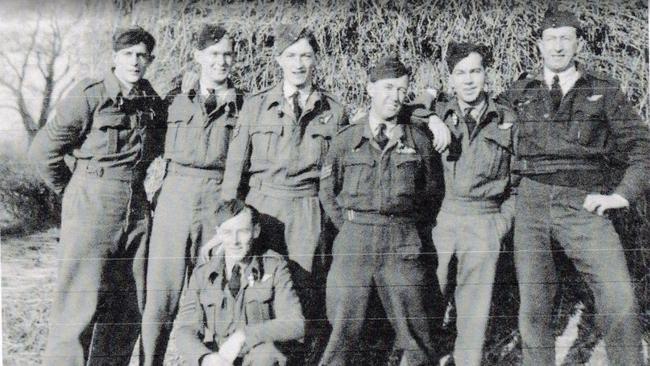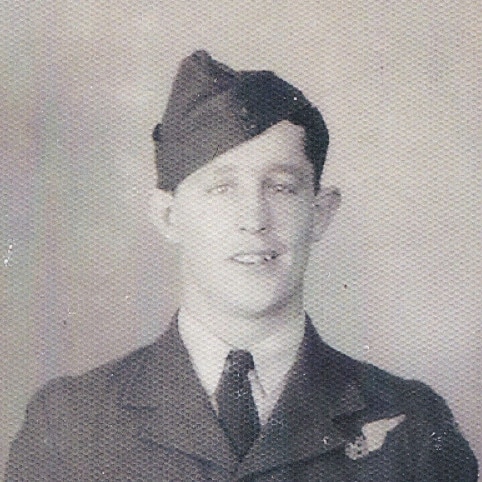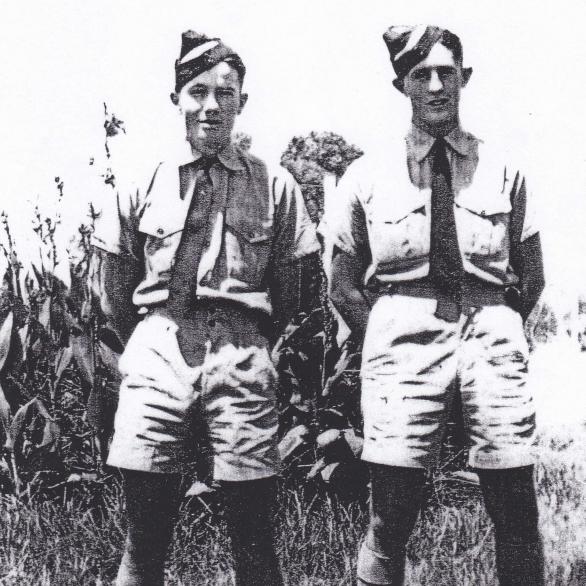Nuremberg raid: The Qld hero of one of the great military debacles
An extraordinary World War II raid that has largely faded from living memory will never be forgotten by one Queensland family, as that night marked the loss of a good natured 20-year-old relative who was little more than a boy.

QLD News
Don't miss out on the headlines from QLD News. Followed categories will be added to My News.
Jack Newman was a “mug’’ – a mid-upper gunner – and he died 80 years ago this weekend when his Lancaster Bomber was shot out of the skies over Germany during one of the great military debacles of World War 11.
The Nuremberg Raid which took place on March 30/31 1944 has largely faded from living memory.
Yet there is one Queensland family which has never forgotten that extraordinary night and the loss of a good natured 20-year-old Australian who was little more than a boy when his life ended.
John Bede (Jack) Newman, born on a farm in rural New South Wales, was one of about 50 Australians killed when Britain’s Bomber Command sent 795 bombers, including 75 from the four Royal Australian Air Force squadrons, to bomb Nuremberg on March 30 1944.
Ninety-five aircraft, including five Australian aircraft, failed to return.
Jack’s nephew, Brian Newman, 69, born in Dalby and now a retired teacher living in far Taylor’s Beach near Ingham, has kept the memory of his uncle and the “Nuremberg Raid’’ alive for decades, even placing “in memoriam’’ notices in a newspaper on the 70th anniversary in 2014.

Brian grasped the impact of his uncle’s death in a poignant moment from his boyhood when he attended his grandparents’ 50th wedding anniversary in Toowoomba in 1967.
It was a happy occasion, yet when one of the speakers made a respectful reference to Jack, both his grandparents (Jack’s parents) suddenly began to weep.
“I had never seen my grandfather cry before that,’’ he said.
“It just brought home to me how much pain they had been through, and what they were clearly still going through.’’
Jack’s father, Walter, had given his written permission for his son to sign up for military service which was then a requirement for all recruits aged under 21.
“Walter always felt bad about signing him up,’’ Brian said.
“He did not have to go to war, he was a farm worker and exempt, but he wanted to go.’’
Jack’s letters home to the folks, one dated October 1943, just six months before his death, reveals a young Australia having the adventure of his life.
“I had a swell trip over, coming right across America by train and then on to England,’’ Jack wrote.
“It has really been a grand adventure for me and I have seen many fine places.
“I have visited such places as London, Birmingham, Brighton, Sheffield, Doncaster and many many other places in all corners of England.’’
Brian’s dad, Bill, Jack’s brother, was also a combat pilot who once crash landed a B-24 Liberator Bomber with a collapsed undercarriage in India after a torrid mission which cost the lives of two airmen.
At war’s end Bill came home, took up a “soldier’s settlement” block of land outside Dalby, farmed sheep and wheat, brought up a family and hardly ever spoke of his dead brother.
“Jack and dad were extremely close, but dad spoke very little about him, except maybe after a few beers,’’ Brian said.

Nuremberg was a key target for allied bombing partly because of its cultural significance and status in Germany as the site of the famous Nazi Nuremberg rallies.
The most famous, or infamous, raid on the city was on January 2 1945 when 521 British Bombers dropped 6,000 high explosive bombs and incendiary devices on the city creating a firestorm which destroyed the old town precinct and caused more than 1800 deaths.
Yet Brian believes Australians should remember the night of March 30 1944, if only to marvel at how badly bombing missions can go in the fog of war, and how literally millions of young lives were so easily lost in those years spanning 1939 to 1945.
Strong winds were blowing on the night of the raid making flying difficult, the night was crystal clear despite weather forecasts of cloud cover, a near full moon was providing perfect lighting for the enemy and vaper trails from the allied engines were showing up so clearly that the Germans fighter pilots didn’t need radar, but just followed the trails to hit their target.
‘’I didn’t know him, but Jack’s death has really had an impact on my family for generations,’’ Brian says of his uncle.
“I suppose my uncle’s loss might just be seen as part of the futility of war, but I think we should always try and remember that generation of Australians who fought in World War 11.
“The huge majority of them are gone, but the sacrifices they made should not be forgotten.’’
Jack’s final resting place is Berlin, 1939-1945 War Cemetery.



